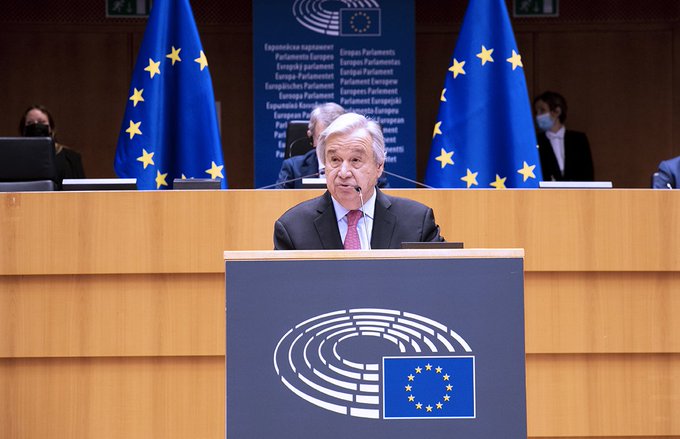Brussels/New York, June 24 – The European Union is the world’s top supporter of the United Nations and largest humanitarian donor at a time more than 40 million people are facing famine, UN Secretary-General Antonio Guterres said in remarks to the plenary session of the European Parliament.
“We live at a time when the strategic partnership between the European Union and the United Nations is more indispensable than ever,” said Guterres, who has been re-appointed to a second, five-year term starting in January 2022. “On behalf of the United Nations, let me begin with two words: Thank you.”
Guterres said the EU and its members contributed to the UN regular and peacekeeping budgets and provided UN agencies with life-saving voluntary contributions to support development activities and other crucial work, including human rights.
“I thank you for working with the United Nations to help the most vulnerable populations in more than 170 countries,” he said. In addition, he said the EU helped to implement institutional reforms of the UN in past decades to make the organization “more agile and fit for purpose in an ever changing global environment.”
The World Food Program reported in June 2021 that 41 million people in 43 countries, up from 27 million in 2019, are “teetering on the very edge of famine.”
“I am heartbroken at what we’re facing in 2021. We now have four countries where famine-like conditions are present”, WFP chief David Beasley told the agency’s Executive Board on June 21, 2021.
WFP said hundreds of thousands of people are already experiencing famine-like conditions in Ethiopia, Madagascar, Somaiia, South Sudan and Yemen. It said people in Nigeria and Burkina Faso are also of particular concern as they have pockets where famine-like conditions are present.
The agency said southern Madagascar is experiencing its worst drought in four decades with more than 1.14 million people threatened with food insecurity.
WFP said conflict, climate change and economic woes like soaring food prices in low-income countries can lead to widespread hunger.
“I want to emphasize just how bad it is out there. Today, 41 million people are literally knocking on famine’s door. The price tag to reach them is about US$ 6 billion. We need funding and we need it now,” Beasly said.
The EU has been in the forefront of the global efforts against the coronavirus pandemic, providing financial support to the World Health Organization’s COVAX facility on which developing and low-income countries rely on to receive vaccines against the COVID-19 virus.
Guterres said the pandemic has revealed “utterly inadequate health systems” around the world and “huge gap” in social protection and major structural inequalities “within and between countries” showing that some countries are on the way of recovery while others are still deep in infection cases and deaths.
He said unless African countries receive an additional 225 million vaccine doses now, 90 per cent of those countries will miss the target of vaccinating 10 per cent of their population by September.
On the other hand, 11 billion vaccine doses are needed in order to vaccinate 75 per cent of the world population in 2021-2022.
WHO reported that Africa is currently facing a fast-surging third wave of COVID-19 pandemic, with 474,000 new cases as of June 20, which represented a 21-per-cent increase over the previous 48-day period in 12 countries. It said the new surge is a combination of weak observance of public health measures, increased social interaction and movement as well as the spread of variants.
Such high demands of vaccines would require “voluntary licenses, technology transfers to patent pooling and flexibility on intellectual property rights” and
the mobilization of pharmaceutical companies and key industry actors, he said.
“The European Union must use its leverage as a global actor to help in this effort and ensure fair and equitable access to vaccines for all,” Guterres said.
The UN chief addressed other issues in which the EU has actively contributed, including climate change, cyber security and digital transformation. He said the EU has is the world’s prime proponent of a “more open, inclusive and secure digital future for all, and of safeguarding human rights online.”
“From cyber security governance and open data to net neutrality and the digitalization of public services, the European Union has demonstrated global leadership and set global standards,” he said, adding that the international community can emulate the human-centric European approach to digital transformation, digital rights, consumer protection, privacy, and the ethical development of artificial intelligence.
“The United Nations and the European Union have much in common,” he said.
“Both organizations were built on shared principles and a strong commitment to the international rule of law, with the aim to prevent past tragedies and build a more peaceful and prosperous world. We both aspire to put human rights at the forefront of our efforts.”
United Nations correspondent journalists – United Nations correspondent journalists – United Nations correspondent journalists
United Nations journalism articles – United Nations journalism articles – United Nations journalism articles

